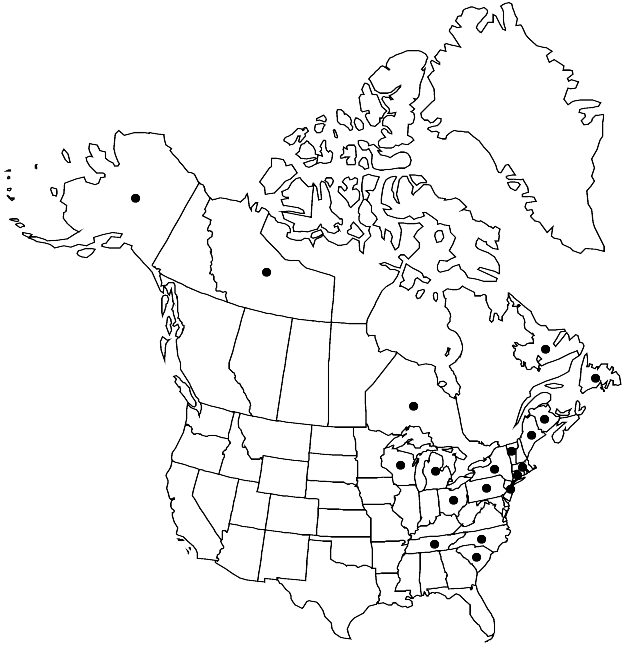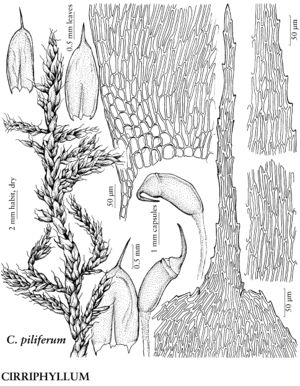Difference between revisions of "Cirriphyllum piliferum"
Bull. Torrey Bot. Club 25: 225. 1898.
FNA>Volume Importer |
FNA>Volume Importer |
||
| Line 29: | Line 29: | ||
|elevation=low to moderate elevations (0-500 m) | |elevation=low to moderate elevations (0-500 m) | ||
|distribution=N.B.;Nfld. and Labr.;N.W.T.;Ont.;Alaska;Conn.;Maine;Mass.;Mich.;N.J.;N.Y.;N.C.;Ohio;Pa.;S.C.;Tenn.;Vt.;Wis.;Europe;Asia;n Africa. | |distribution=N.B.;Nfld. and Labr.;N.W.T.;Ont.;Alaska;Conn.;Maine;Mass.;Mich.;N.J.;N.Y.;N.C.;Ohio;Pa.;S.C.;Tenn.;Vt.;Wis.;Europe;Asia;n Africa. | ||
| − | |discussion=<p>Cirriphyllum piliferum is easy to recognize by its rather large size, usually pure green and somewhat whitish color, and regular pinnate branching. The concave-inflated and closely imbricate distal leaves are abruptly contracted into filiform acumens, resulting in a peculiar appearance when they stand at a sharp, broad angle from the upper shoot (when wet, as usually occurs in the field). When a shoot is examined against a dark background, the acumens are usually easily visible, allowing for ready field identification. Brachythecium (Cirriphyllum) cirrosum differs from C. piliferum by its more abruptly contracted, so more strongly piliferous, leaves, and branch leaves that do not much differ from stem leaves (in C. piliferum, the branch leaves are not or at least less strongly piliferous); the irregular branching (fairly regular in C. piliferum); the usual yellow color of the plants (usually green in C. piliferum); and rather small alar cells (enlarged in C. piliferum).</p> | + | |discussion=<p><i>Cirriphyllum piliferum</i> is easy to recognize by its rather large size, usually pure green and somewhat whitish color, and regular pinnate branching. The concave-inflated and closely imbricate distal leaves are abruptly contracted into filiform acumens, resulting in a peculiar appearance when they stand at a sharp, broad angle from the upper shoot (when wet, as usually occurs in the field). When a shoot is examined against a dark background, the acumens are usually easily visible, allowing for ready field identification. <i>Brachythecium</i> (<i>Cirriphyllum</i>) cirrosum differs from <i>C. piliferum</i> by its more abruptly contracted, so more strongly piliferous, leaves, and branch leaves that do not much differ from stem leaves (in <i>C. piliferum</i>, the branch leaves are not or at least less strongly piliferous); the irregular branching (fairly regular in <i>C. piliferum</i>); the usual yellow color of the plants (usually green in <i>C. piliferum</i>); and rather small alar cells (enlarged in <i>C. piliferum</i>).</p> |
|tables= | |tables= | ||
|references= | |references= | ||
| Line 52: | Line 52: | ||
|publication year=1898 | |publication year=1898 | ||
|special status=Selected by author to be illustrated | |special status=Selected by author to be illustrated | ||
| − | |source xml=https://jpend@bitbucket.org/aafc-mbb/fna-data-curation.git/src/ | + | |source xml=https://jpend@bitbucket.org/aafc-mbb/fna-data-curation.git/src/8f726806613d60c220dc4493de13607dd3150896/coarse_grained_fna_xml/V28/V28_673.xml |
|genus=Cirriphyllum | |genus=Cirriphyllum | ||
|species=Cirriphyllum piliferum | |species=Cirriphyllum piliferum | ||
Revision as of 18:07, 18 September 2019
Plants soft, glossy. Stems to 10 cm, branches to 15 mm, straight. Stem leaves 1.8–2.6 × 1–1.5 mm; base slightly rounded to insertion; margins recurved proximally, plane distally; alar region triangular, abruptly delimited, reaching from margin 50% distance to costa; laminal cells 50–110 × 6–10 µm, walls sometimes strongly porose in proximal part of leaf. Branch leaves to 2 × 0.7 mm. Seta 1–3 cm. Capsule 2–2.5 mm.
Habitat: Soil, humus, duff, decaying wood, limestone, mesic to wet forests, ravine slopes, tall herb vegetation
Elevation: low to moderate elevations (0-500 m)
Distribution

N.B., Nfld. and Labr., N.W.T., Ont., Alaska, Conn., Maine, Mass., Mich., N.J., N.Y., N.C., Ohio, Pa., S.C., Tenn., Vt., Wis., Europe, Asia, n Africa.
Discussion
Cirriphyllum piliferum is easy to recognize by its rather large size, usually pure green and somewhat whitish color, and regular pinnate branching. The concave-inflated and closely imbricate distal leaves are abruptly contracted into filiform acumens, resulting in a peculiar appearance when they stand at a sharp, broad angle from the upper shoot (when wet, as usually occurs in the field). When a shoot is examined against a dark background, the acumens are usually easily visible, allowing for ready field identification. Brachythecium (Cirriphyllum) cirrosum differs from C. piliferum by its more abruptly contracted, so more strongly piliferous, leaves, and branch leaves that do not much differ from stem leaves (in C. piliferum, the branch leaves are not or at least less strongly piliferous); the irregular branching (fairly regular in C. piliferum); the usual yellow color of the plants (usually green in C. piliferum); and rather small alar cells (enlarged in C. piliferum).
Selected References
None.
